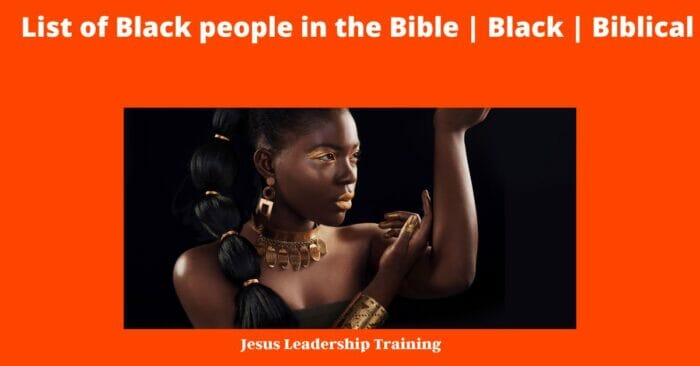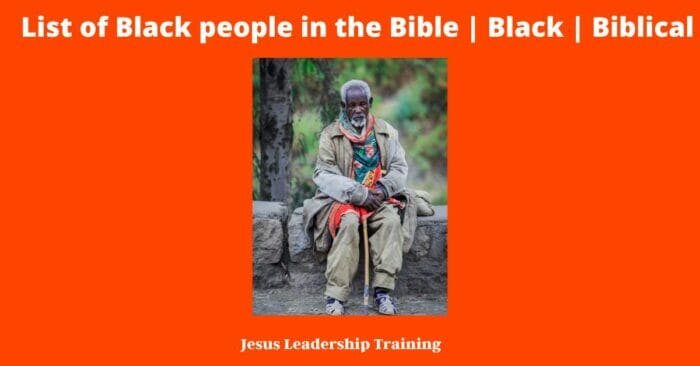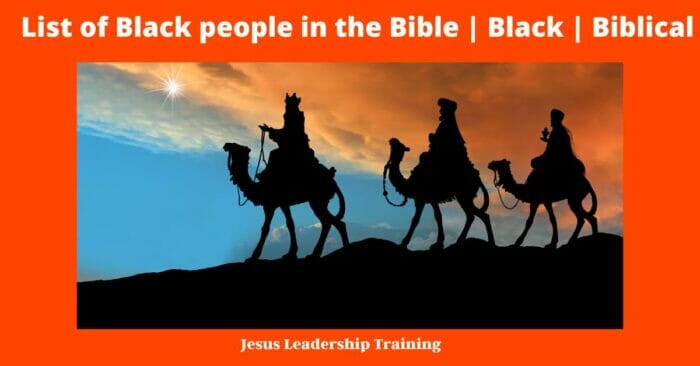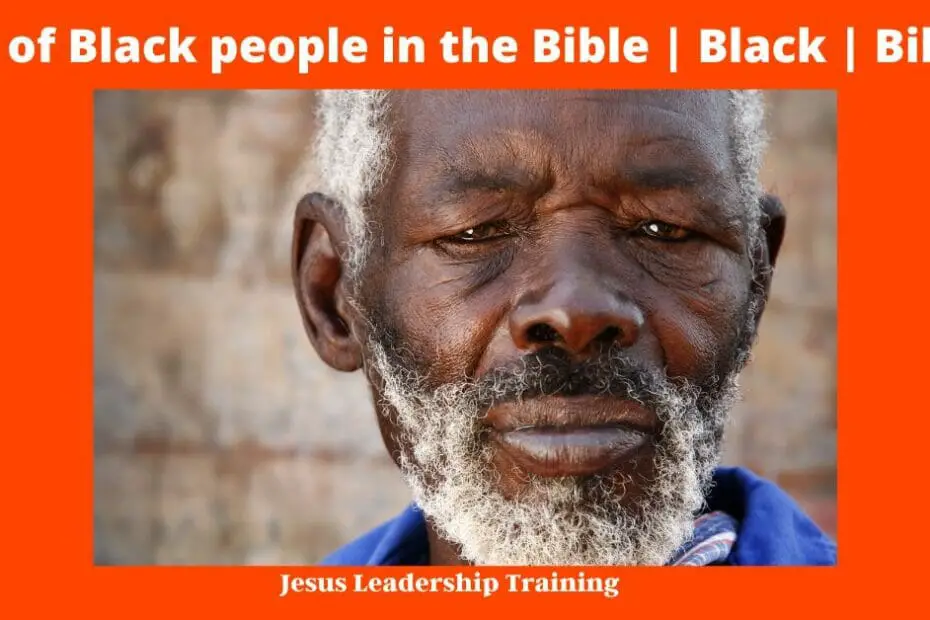Black Bible Characters – Did you know that there are black people in the Bible? In fact, there are quite a few! This list will give you a brief overview of some of the most notable black people in the Bible. We hope that this list will help dispel some of the myths and misconceptions about black people and the Bible.
Table of Contents
Black Bible Characters
While the Bible does not explicitly state the race of any of its characters, there are a number of individuals who are generally considered to be black. These include:
- Noah’s wife, who is often identified as a Canaanite;
- Ham, the son of Noah; and
- Nimrod, a great-grandson of Noah. Other black figures in the Bible include the
- Queen of Sheba, who was the ruler of an ancient kingdom in Africa;
- Bilhah and Zilpah, two of Jacob’s wives; and
- Simon of Cyrene
- Zipporah – Moses’ Wife
- Ethiopian Eunuch
- Queen Esther
- Song of Solomon, One of Solomons’s Lovers
- Cushites
- Sabeans
Pharaoh’s daughter, rescued the infant Moses from the Nile River.
While the Bible does not provide a complete list of all black people (Black Presence)who appear within its pages, these individuals offer a glimpse into the rich diversity of cultures and races that are represented in Scripture.

How Does the Bible Explain the Difference in People’s Colors
The Bible offers a few explanations for the differences in people’s skin colors. One explanation is that the sun was stronger in Noah’s time, and since then, people have been getting progressively lighter skinned. Another explanation is that Noah’s sons married women from other nations, and their offspring had different skin colors.
A third explanation is that the different color skins came about as a result of God’s curse on Ham. Whatever the reason for the different colors, the Bible is clear that all humans are descended from Noah and his family, and we are all equal in God’s eyes.
Human History is recorded in bible verses in the old Hebrew Bible, and also from Jesus Christ, the apostle Paul and other Biblical Characters. In ancient Times world, wide slave owners were captured by Roman Soldiers in their conquest. Early Christians no matter what color, were involved in Bible study,
Christian Education, and Learning the Books of the Bible. Early Christians guided by the Holy Spirit took the Good News from the Nation of Israel and Shared it with the world.
The Bible does not explicitly state the reason for the difference in human skin color. However, there are a few possible explanations that could be drawn from biblical passages. One possibility is that the difference in skin color is a result of the Curse of Ham. In Genesis 9:20-27, Ham commits a sin against his father Noah, and is cursed by Noah. One of the consequences of this curse is that Ham’s descendants will be “servants of servants.” Some interpreters believe that this refers to slavery and that the difference in skin color is a result of Ham’s descendants being enslaved by those of Shem and Japheth.
Another possibility is that the difference in skin color is simply a natural variation within the human race, with no specific spiritual significance. This is supported by the fact that, in passages such as Acts 17:26, God is said to have made all people from one blood, regardless of their physical appearance. Ultimately, the Bible does not give a definitive answer as to why there is a difference in human skin color. But whichever interpretation we choose, we can be confident that all people are created equal in God’s eyes and are deserving of his love and grace.
What Color was Jesus?
There is no easy answer to the question of what color Jesus was, as there is no direct evidence in the Bible to provide a definitive answer. However, based on the descriptions of Jesus in the Bible, it is likely that he had dark skin. For example, in the book of Revelation, Jesus is described as having hair “like wool” and eyes “like a flame of fire.” These characteristics are often associated with people of Middle Eastern or North African descent. In addition,
the fact that Jesus was born in Bethlehem and spent most of his life in Israel also suggests that he had dark skin. While we may not know for certain what color Jesus was, it is clear that he was a man from the Middle East who preached a message of love and acceptance for all people. People are in all colors, Black Man, White, Yellow, and Red, and People of color are scattered across the face of the Earth.
Where are Black People First Mentioned in The Bible?
Black people are first mentioned in the Bible in the book of Genesis, chapter 10, verse 6. In this verse, we are told that Noah had three sons: Shem, Ham, and Japheth. From these sons, came the nations of the world. One of Shem’s descendants was Cush, who is considered to be the father of the black race. It is believed that Cush was born around 2200 BC, making him one of the earliest recorded ancestors of modern-day black people.
While some may argue that black people are not specifically mentioned by name in the Bible until later books such as Exodus or Numbers, it is clear from Genesis 10:6 that they were always intended to be part of God’s plan for humanity. The fact that they are listed alongside Shem and Japheth- two of the most prominent figures in biblical history- shows that they were always meant to play a significant role in God’s story.
As we continue to read the Bible, we see that black people played vital roles in shaping both Old and New Testament history. From Moses to Solomon to Esther to Paul, their contributions continue to inspire and challenge us today. So when we ask where black people are first mentioned in the Bible, the answer is simple: right from the very beginning.
What is the Wealthiest Black Person in the Bible?
The Wealthiest Black Person in the Bible is actually not one person, but a group of people. They are known as the Sheba, and they lived in a land that is now part of Ethiopia. The Sheba was extremely wealthy, and they were known for their exotic trade goods. They were also known for their wisdom, and they were said to be able to interpret dreams. The Queen of Sheba was the most famous member of the Sheba, and she is said to have visited Solomon to test his wisdom. The Sheba was a significant force in the ancient world, and their wealth is a testimony to their success.

What Black Africans are in the Bible
The Bible contains many references to black Africans, both in the Old and New Testaments. In the Old Testament, black Africans are mentioned in connection with the Queen of Sheba and the Hamites. In the New Testament, black Africans are mentioned in connection with the Ethiopian eunuch and Simon of Cyrene. Black Africans are also mentioned in several Psalms, such as Psalm 68:31, which speaks of “the Ethiopians [who] shall stretch out their hands unto God.”
In addition, the Book of Revelation mentions “a great multitude, which no man could number, of all nations, and kindreds, and people, and tongues” Stand before the throne and before the Lamb (Revelation 7:9). This great multitude is undoubtedly included black Africans among its ranks. Therefore, we see that the Bible contains numerous references to black Africans, both in the Old and New Testaments.
In the book of Revelation, John sees a multitude from every nation, tribe, and tongue, including black people, worshiping God in heaven. Throughout Scripture, we see that God values diversity and includes all people in his plan of redemption. Consequently, we should also value diversity and strive to include all people in our churches and communities. By doing so, we can truly reflect the image of God, who loves all people and desires to see them flourishing in relationship with him.
Who was the Queen of Sheba?
The Queen of Sheba is a biblical figure who is mentioned in both the Old and New Testaments. In the Old Testament, she is described as a powerful queen who ruled over a wealthy kingdom. She visited Solomon, the king of Israel, and was impressed by his wisdom and wealth. The two exchanged gifts, and she returned to her own kingdom. The Queen of Sheba is also mentioned in the New Testament, where she is described as an example of someone who was blessed by God. While there are many theories about her identity, she remains an intriguing figure from the Bible.
The ancient kingdom of Sheba was located in the southwest corner of the Arabian Peninsula. Its precise boundaries are uncertain, but it is thought to have included parts of modern-day Yemen, Oman, and the Horn of Africa. The kingdom was known for its wealth and luxury, and its capital, Sana’a, was considered one of the most beautiful cities in the world.
The queen of Sheba was said to be a wise and powerful ruler, and she is often mentioned in the Bible. According to tradition, she visited King Solomon in Jerusalem and exchanged gifts with him. The kingdom of Sheba eventually declined in importance, and it was eventually absorbed into other kingdoms. However, the legend of the queen of Sheba has lived on, and she remains one of the most famous figures in Arabian history.
Who was the Simon of Cyrene
Simon of Cyrene was the man who was selected by the Romans to carry the cross of Jesus Christ when Jesus was too weak to carry it any further. Cyrene was a city in North Africa that is now in modern-day Libya. Simon was most likely a Jew who had come to Jerusalem for the Passover. He was probably pressed into service by the Romans as they were known to do. Once he helped Jesus carry his cross, he became a follower of Christ and his story is told in all four Gospels. Some believe that Simon may have even been one of the Seventy Disciples that Jesus commissioned to spread the Gospel throughout Israel.
After the crucifixion, Simon returned to Cyrene and preached the Gospel there, leading many to faith in Christ. His story reminds us that anyone can be called by God to serve him, no matter where they are from or what their background may be. We also see from Simon’s story that once we have been touched by the love of Christ, we can’t help but share that love with others.
Who was the Ethiopian Eunuch?
The Ethiopian Eunuch is a figure from the New Testament who appears in the Acts of the Apostles. He is a court official from Ethiopia who was converted to Christianity by the apostle Philip. The Ethiopian Eunuch is an important figure in early Christianity because he is one of the first Gentiles to convert to the faith. His conversion demonstrates that Christianity is not just for Jews, but for all people.
The Ethiopian Eunuch is also significant because he is an example of someone who was not able to receive baptism through traditional means. He was not able to be baptized in a church because he was not a member of the Christian community. Instead, he was baptized by Phillip in a river. This shows that baptism is available to all people, even if they are not able to access a church. The story of the Ethiopian Eunuch is an important part of early Christian history and remains relevant today.
Who was the Zipporah – Moses’ Wife?
Zipporah was Moses’ wife, and she is first mentioned in Exodus 2:21. She was a daughter of Jethro, the priest of Midian, and she bore two sons to Moses: Gershom and Eliezer. Although we don’t know a great deal about her, we can see from the few details that are given that she was a woman of faith.
For example, when God was about to kill Moses because he had not circumcised his son, Zipporah took swift action to save her husband’s life (Exodus 4:24-26). This shows us that she trusted in the Lord and was willing to obey His commands, even when they didn’t make sense to her. Additionally, when Moses fled from Egypt after killing an Egyptian, it was Zipporah who helped him to find refuge in Midian (Exodus 2:15-21). This act of kindness no doubt saved Moses’ life, and it demonstrates her compassionate nature. From what we can see, Zipporah was a godly woman who played a significant role in the life of Moses.
We know that Meriam and Aaron spoke against her.
Meriam and Aaron were Moses’ siblings, and they spoke against Zipporah because they didn’t think that she was good enough for their brother. It’s possible that they thought she wasn’t good enough because she was a Midianite, or because she wasn’t Jewish. However, we see from the way that God dealt with them that He was not pleased with their attitude. For example, when they spoke against Zipporah,

God struck Meriam with leprosy (Numbers 12:12). This shows us that God was not happy with their treatment of Zipporah and that He considered her to be an important part of Moses’ life. We can learn from this story that we should not judge others based on their background or ethnicity. Instead, we should treat everyone with respect and love, just as God does.
Final Thoughts – List of Black People in the Bible
The list of black people in the Bible is a long one, and it includes many important figures. From Simon of Cyrene to the Ethiopian Eunuch, these men and women played a significant role in early Christianity. Their stories remind us that anyone can be called by God to serve Him, no matter their background or ethnicity. We can also learn from their stories that baptism is available to all people and that we should not judge others based on their background or ethnicity. These men and women were all important figures in early Christianity, and their stories continue to be relevant today.
God Bless Greg
Best Bible Encyclopedias and Dictionaries
Below is a table featuring some highly regarded Bible Encyclopedias and Dictionaries along with their publishers and websites where they can be found or purchased.
| Title | Publisher | Website |
|---|---|---|
| The International Standard Bible Encyclopedia | Eerdmans | Eerdmans |
| Zondervan’s Pictorial Bible Dictionary | Zondervan | Zondervan |
| Easton’s Bible Dictionary | Thomas Nelson | Thomas Nelson |
| Holman Illustrated Bible Dictionary | B&H Publishing Group | B&H Publishing Group |
| The New Unger’s Bible Dictionary | Moody Publishers | Moody Publishers |
| HarperCollins Bible Dictionary | HarperOne | HarperOne |
| Vine’s Complete Expository Dictionary of Old and New Testament Words | Thomas Nelson | Thomas Nelson |
You can generally find these resources on the publishers’ websites, as well as other online book retailers such as Amazon or Christianbook. It’s always good practice to confirm availability and review additional details on the specific websites or other reliable online bookstores.




